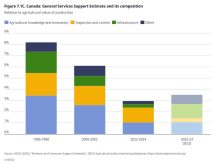Shorter shipping stretches sought: A private members bill now before Parliament would reduce the maximum transportation time for ruminant livestock from 52 hours to 12 hours and from 36 to eight hours for pigs, poultry and horses. Bill C-468 was tabled by Brossard-La Prairie MP Alexandra Mendes October 28, according to the Canadian Coalition for Farm Animals. The coalition says current animal transport regulations have been in place more than 30 years and are outdated. Professor passes:RobertE. Roughley, a professor in the University of Manitoba’s entomology department, died suddenly Nov. 9 as a result of an apparent heart attack. Roughley, 59, was originally from Guelph. He joined the Department of Entomology in 1982. In addition to his teaching and research, Roughley was the curator of the J. B. Wallis Museum of Entomology and supervised the “Bug Line” public information service provided by the Department of Entomology. He is survived by his wife Pearl and three children. Keep on trading: A drive towards self-sufficiency after last year’s food crisis will fail, a top executive at agricultural commodities trader Cargill has warned, the Financial Times reported Nov. 10.
Read Also

The sneak peek of Manitoba Ag Days 2026
Canada’s largest indoor farm show, Manitoba Ag Days, returns to Brandon’s Keystone Centre Jan. 20-22, 2026. Here’s what to expect this year.
“Promoting a free and open trading system whereby countries can produce what they are best able…and surpluses can be traded across international boundaries is the right way to go,” Paul Conway, senior vice-president at Cargill said, the FT reported. “Not all countries can single-handedly be self-sufficient in all food commodities.”
CASA efforts supported:
The federal government is contributing $5 million to support the Canadian Agricultural Safety Association (CASA). This investment will help create CASA safety exhibits, web resources and training material to help farmers spot and remedy hazards. Funding will also be used to support CASA’s award-winning Progressive Agricultural Safety Days – day-long events held throughout the country to make rural youth aware of the hazards on the farm and in a rural environment. CASA will be co-ordinating 75 such days in 2010.














